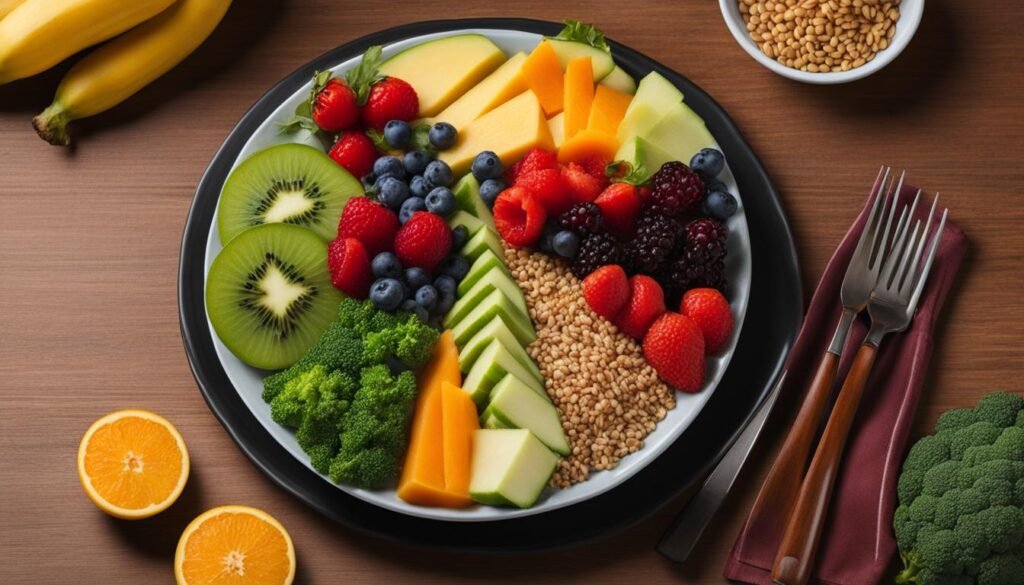Are you looking to improve your overall wellness and achieve optimal health? One of the most effective ways to do so is by adopting the healthiest eating lifestyle. By consuming a healthy diet and practicing clean eating, you can nourish your body with the right nutrients and prevent various health conditions.
But what is the healthiest eating lifestyle? It involves making mindful choices about the foods and beverages you consume and adopting sustainable habits that support your overall well-being. In this article, we will explore the principles of a healthy diet and the importance of clean eating for optimal wellness.
Key Takeaways:
- The healthiest eating lifestyle involves mindful choices and a balanced approach to nutrition.
- Clean eating principles and consuming whole and nutrient-dense foods are crucial for optimal health.
- A healthy diet plays a vital role in nourishing your body with the right nutrients and preventing health conditions.
Understanding a Healthy Diet
Eating a healthy diet is essential for maintaining optimal wellness. A healthy diet means consuming a variety of foods that provide balanced nutrition and nourish your body. Here, we will explore the concept of a healthy diet and the principles of mindful eating, plant-based nutrition, and balanced meals.
Mindful Eating
Mindful eating is a practice that involves paying attention to your food and the experience of eating. It means being present and fully engaged in the process of eating, without distractions like phones or television. By practicing mindful eating, you can better tune in to your body’s signals of hunger and fullness, which can help prevent overeating and promote healthy weight management.
Plant-Based Nutrition
A plant-based diet emphasizes whole, minimally processed plant foods like fruits, vegetables, legumes, and whole grains. This type of diet can provide a wealth of essential nutrients and fiber, while also promoting a more sustainable food system. Research suggests that a plant-based diet may help lower the risk of chronic diseases like heart disease, diabetes, and certain cancers.
While a plant-based diet can be highly nutritious, it’s important to ensure you’re getting enough protein and other key nutrients. Good protein sources for plant-based eaters include beans, lentils, tofu, tempeh, nuts, and seeds.
Balanced Meals
Balance is key when it comes to creating healthy meals. A balanced meal should include a mix of macronutrients – carbohydrates, proteins, and fats – as well as fiber-rich fruits and vegetables. Aiming for a variety of colors and textures on your plate can help ensure you’re getting a range of vitamins, minerals, and other beneficial compounds.
When planning meals, try to incorporate a mix of healthy proteins like grilled chicken, baked fish, or legumes; complex carbohydrates like quinoa, brown rice, or sweet potatoes; and healthy fats like avocado, nuts, or olive oil.
The Basics of Clean Eating
Clean eating is a simple yet powerful concept that can transform your health. It focuses on consuming wholesome food that is minimally processed and free of additives, preservatives, and artificial ingredients. By opting for nutritious meals that contain natural ingredients, you can enjoy a myriad of health benefits, including weight management, improved digestion, and enhanced energy levels.
One of the primary principles of clean eating is to choose whole foods over processed ones. Whole foods are foods that are as close to their natural state as possible. This includes fruits, vegetables, whole grains, nuts, and seeds. These foods are packed with nutrients that nourish your body, such as fiber, vitamins, and minerals.
To adopt sustainable eating habits, it is important to prioritize nutritious meals that are well-balanced. This means including a variety of foods from all food groups, such as lean protein, healthy fats, and complex carbohydrates. By creating meals that contain a balance of macronutrients, you can avoid feeling hungry and deprived while also providing your body with the necessary fuel it needs to function optimally.
Preparing meals that are both nutritious and delicious is easier than you may think. There are plenty of simple recipes that use wholesome ingredients and require minimal preparation time. You can also make small swaps in your favorite recipes to make them more nutritious, such as using whole-grain pasta instead of white pasta or swapping out butter for avocado oil.
Wholesome Food Choices
When it comes to choosing wholesome food, there are a few key principles to keep in mind. Firstly, opt for foods that are as close to their natural state as possible. This includes fresh fruits and vegetables, whole grains, and lean proteins such as chicken, fish, and tofu.
Secondly, choose foods that are minimally processed. This means avoiding foods that contain additives, preservatives, and artificial ingredients. When shopping for packaged foods, read the labels carefully and look for products that contain recognizable ingredients.
Lastly, prioritize organic and locally sourced foods whenever possible. These foods are often fresher and have a higher nutritional value than their conventionally grown counterparts. Additionally, choosing locally sourced foods helps to support local farmers and reduces your carbon footprint.
Preparing Nutritious Meals
Preparing nutritious meals doesn’t have to be complicated or time-consuming. By following a few simple guidelines, you can create meals that are both healthy and delicious. Here are some tips:
- Choose recipes that use whole foods and natural ingredients.
- Incorporate a variety of foods from all food groups.
- Use healthy cooking methods, such as grilling, roasting, or steaming.
- Avoid using excessive amounts of salt or sugar in your cooking.
- Get creative with spices and herbs to add flavor to your dishes.
By taking the time to plan and prepare nutritious meals, you can make clean eating a sustainable habit that benefits your overall health and well-being.
The Role of Macronutrients in a Healthy Diet
Macronutrients are the nutrients needed in large amounts by the body to maintain optimal health. A balanced diet should include healthy fats, lean proteins, and complex carbohydrates in the right proportion to fuel the body and support vital functions.
Healthy Fats
Healthy fats are essential for a healthy diet and play a vital role in maintaining overall health. They provide energy, help absorb essential vitamins, and support brain function. Sources of healthy fats include:
- Avocado
- Nuts and seeds
- Fatty fish like salmon or trout
- Olives and olive oil
- Coconut and coconut oil
- Chia seeds and flaxseeds
Lean Proteins
Lean proteins are crucial for building and repairing tissues, and maintaining muscle mass. They also help to balance blood sugar levels and keep you feeling full longer. Sources of lean proteins include:
- Chicken breast
- Fish and seafood
- Eggs
- Lean cuts of beef or pork
- Legumes like lentils and beans
- Tofu and tempeh
Complex Carbohydrates
Complex carbohydrates provide the body with the long-lasting energy it needs to function properly. They also help to regulate blood sugar levels and promote feelings of fullness. Sources of complex carbohydrates include:
- Whole grains like brown rice and quinoa
- Vegetables like sweet potatoes, corn, and peas
- Beans and legumes
- Fruits like apples and berries
“By consuming a balanced diet with the right proportion of macronutrients, you can support your body’s functions and maintain good health.”
The Power of Micronutrients

Micronutrients are essential nutrients needed in small quantities for our bodies to function properly. They include vitamins, minerals, and antioxidants, and are crucial for maintaining optimal health.
Vitamins
Vitamins are organic compounds that our bodies need in small amounts to sustain life. They play a vital role in the regulation of bodily functions, including the immune system, metabolism, and vision. Some common vitamins include:
- Vitamin A: Supports healthy skin, vision, and immune function. Sources include sweet potatoes, carrots, and spinach.
- Vitamin C: An antioxidant that assists in collagen production, wound healing, and immune function. Citrus fruits, berries, and leafy greens are excellent sources.
- Vitamin D: Helps regulate calcium absorption and plays a role in bone health and immune function. Sun exposure and fatty fish are good sources.
Minerals
Minerals are inorganic substances that are essential for proper bodily function. They play a crucial role in maintaining the body’s fluid balance, nerve function, and structural support. Some common minerals include:
| Mineral | Function | Sources |
|---|---|---|
| Calcium | Helps build and maintain strong bones and teeth, and aids in muscle contraction and nerve function. | Dairy products, leafy greens, and fortified foods. |
| Magnesium | Supports muscle and nerve function, regulates heart rhythm, and aids in bone health. | Leafy greens, nuts, seeds, and whole grains. |
| Iron | Helps transport oxygen throughout the body and aids in the production of red blood cells. | Red meat, poultry, fish, beans, and fortified cereals. |
Antioxidants
Antioxidants protect the body from damage caused by free radicals, which can contribute to chronic diseases such as cancer and heart disease. Some common antioxidants include:
- Vitamin E: Supports healthy skin, eyes, and immune function. Sources include nuts, seeds, and leafy greens.
- Selenium: Helps protect the body from oxidative stress and supports immune function. Nuts, seeds, and seafood are good sources.
- Flavonoids: Found in a variety of fruits, vegetables, and legumes, flavonoids may help reduce the risk of chronic diseases such as cancer and heart disease.
Consuming a variety of whole, nutrient-dense foods is the best way to ensure you are getting an adequate intake of micronutrients. If you are not able to meet your needs through food alone, supplements may be necessary. It’s important to talk to your healthcare provider before starting any new supplements.
The Benefits of Whole Foods
Eating whole foods is an essential aspect of a healthy eating lifestyle. Whole foods refer to foods that are in their natural state or minimally processed. These foods are rich in nutrients, including vitamins, minerals, fiber, and antioxidants. By consuming whole foods, you can provide your body with the nutrition it needs to thrive.
Many whole foods are unprocessed, which means they do not contain added sugars, salts, or other unhealthy additives. Instead, they are made up of simple, natural ingredients that provide your body with the fuel it needs to function properly.
The Importance of Consuming Unprocessed Whole Foods
Unprocessed whole foods are a great way to provide your body with the nutrition it needs without consuming harmful additives. These foods are often rich in fiber, which can help promote a healthy digestive system and reduce the risk of chronic diseases.
Consuming unprocessed whole foods can also give you more energy, as these foods are often easier for the body to digest and use as fuel. Additionally, they can help you maintain a healthy weight, as they are often lower in calories than processed foods.
Using Natural Ingredients in Your Meals
When preparing meals, it’s important to use natural ingredients whenever possible. This means avoiding processed foods and choosing fresh, whole ingredients instead. By doing so, you can ensure that your meals are packed with nutrition and free from harmful additives.
You can incorporate natural ingredients into your meals in a variety of ways. For example, you can use fresh herbs and spices to add flavor to your dishes, or choose whole grain bread for your sandwiches instead of white bread.
Creating Nutritious Meals with Whole Foods
One of the best ways to incorporate whole foods into your diet is by creating nutritious meals with them. For example, you could make a salad with fresh greens, vegetables, and grilled chicken or tofu. Or, you could create a stir-fry with a variety of fresh vegetables, whole grain rice, and lean protein.
Another great way to incorporate whole foods into your diet is by snacking on fresh fruits and vegetables. These foods are rich in fiber and antioxidants, which can help keep your body healthy and strong.
The Role of Portion Control, Mindful Eating, and Balanced Meals in Maintaining Optimal Nutrition

Portion control, mindful eating, and balanced meals are essential elements of a healthy eating lifestyle. By incorporating these practices into your daily routine, you can improve your overall nutrition and prevent overeating.
Portion control involves eating the right amount of food to maintain a healthy weight and prevent overindulging. One technique is to use smaller plates and bowls, which can help you eat less without feeling deprived. Another strategy is to measure your food using measuring cups or a food scale to ensure proper portions.
| Food Group | Recommended Serving Size |
|---|---|
| Grains | 1/2 cup cooked rice, pasta, or cereal |
| Vegetables | 1 cup raw or 1/2 cup cooked vegetables |
| Fruits | 1 medium fruit or 1/2 cup chopped fruit |
| Protein | 3-4 ounces cooked meat, poultry, or fish |
| Dairy | 1 cup milk or yogurt |
Mindful eating involves being present and aware while eating, rather than mindlessly consuming food. This means taking the time to savor each bite, chewing slowly, and paying attention to hunger and fullness cues. By practicing mindful eating, you can enjoy your food more and avoid overeating.
Creating balanced meals involves selecting foods from each food group to ensure that you are getting a variety of nutrients in your diet. The USDA recommends filling half your plate with fruits and vegetables, one-quarter with lean protein, and one-quarter with whole grains. Including a source of healthy fat, such as avocado or nuts, can also help you feel more satisfied.
Remember that a healthy eating lifestyle is all about balance and moderation. By practicing portion control, mindful eating, and creating balanced meals, you can achieve optimal nutrition and improve your overall health.
The Role of Superfoods in a Nutrient-Dense Diet
Superfoods are a group of foods that are packed with nutrients, making them a valuable addition to any healthy diet. These foods are typically low in calories and high in essential vitamins, minerals, and antioxidants, making them an excellent choice for anyone looking to boost their overall nutrition.
Some examples of superfoods include:
- Kale
- Spinach
- Blueberries
- Almonds
- Quinoa
- Chia seeds
These foods are considered nutrient-dense because they provide a substantial amount of nutrients relative to their calorie content. Adding these foods to your diet can help you achieve optimal health and well-being.
Benefits of Superfoods
Superfoods are nutrient powerhouses that offer a range of health benefits. They are packed with antioxidants, which can help protect your cells from damage caused by free radicals. Antioxidants have also been linked to a reduced risk of chronic diseases, such as cancer and heart disease.
In addition to their antioxidant properties, many superfoods are excellent sources of fiber, which can aid in digestion and help you feel fuller for longer. They also contain a range of essential vitamins and minerals, which are important for maintaining strong bones, a healthy immune system, and overall well-being.
Incorporating Superfoods into Your Diet
One of the easiest ways to incorporate superfoods into your diet is to add them to your meals. For example, you could add spinach to your morning smoothie, or include chia seeds in your afternoon snack. You could also try swapping out unhealthy snacks for nutrient-dense options, such as almonds or blueberries.
Another option is to create a superfood salad bowl, which is a delicious and healthy way to incorporate multiple superfoods into one meal. Start with a base of leafy greens, such as kale or spinach, and then add toppings such as quinoa, avocado, almonds, and blueberries. You can finish it off with a healthy salad dressing, such as a vinaigrette made with olive oil and lemon juice.
The Role of Hydration
Proper hydration is essential for maintaining good health. The human body is approximately 60% water, and staying hydrated is vital for numerous bodily functions, including regulating body temperature, transporting nutrients, and removing waste products.
It is commonly recommended to drink at least eight glasses of water per day. However, this can vary depending on factors such as age, gender, weight, and activity level. As a general rule, it is essential to listen to your body’s thirst cues and drink water when you feel thirsty.
Besides water, there are many other healthy beverages that can help with hydration, such as herbal teas, coconut water, and plant-based milk. It is important to avoid sugary drinks like soda and energy drinks, which can contribute to weight gain and other health issues.
| Beverage | Water Content |
|---|---|
| Watermelon Juice | 92% |
| Coconut Water | 95% |
| Cucumber | 96% |
| Herbal Tea | 100% |
In addition to drinking fluids, it is also essential to consume hydrating foods, such as fruits and vegetables. These foods are not only high in water content but are also rich in essential nutrients and antioxidants.
Staying hydrated can help prevent fatigue, headaches, and other symptoms associated with dehydration. It can also promote healthy skin, digestion, and overall wellness. By making hydration a priority in your diet, you can support your body’s essential functions and improve your overall health.
The Impact of Lifestyle Factors on Nutrition

Leading a healthy lifestyle is not just about what you eat, but also about how you live. Lifestyle factors such as sleep, stress management, and physical activity can have a significant impact on your overall nutrition.
Getting Enough Sleep
A good night’s sleep is essential for optimal health. Lack of sleep can disrupt your hormones and lead to overeating and weight gain. It can also affect your ability to make healthy food choices, as you may be more likely to reach for sugary or high-fat foods when you’re tired.
To ensure you’re getting enough rest, try to stick to a regular sleep schedule and get at least 7-8 hours of sleep each night. Avoid caffeine and electronics before bedtime, and create a relaxing environment in your bedroom to promote restful sleep.
Managing Stress
Stress can have a negative impact on your health and nutrition. When you’re stressed, your body produces the hormone cortisol, which can stimulate your appetite and lead to overeating. Stress can also cause you to turn to unhealthy coping mechanisms such as alcohol or junk food.
To manage stress, try relaxation techniques such as deep breathing or meditation. Engage in activities that you enjoy, such as reading or spending time with loved ones. Exercise is also an excellent way to reduce stress and improve mood.
Staying Active
Regular physical activity is an essential part of a healthy lifestyle. Exercise not only helps maintain a healthy weight but also promotes overall wellness. It can improve your mood, boost your energy levels, and reduce your risk of chronic diseases.
Try to incorporate at least 30 minutes of moderate exercise into your daily routine. This could include activities such as walking, jogging, or cycling. Find an activity that you enjoy and make it a habit.
By prioritizing lifestyle factors such as sleep, stress management, and physical activity, you can improve your overall nutrition and well-being.
Tips for Sustaining a Healthy Eating Lifestyle
Adopting a healthy eating lifestyle is not a short-term fix but a long-term commitment. It’s important to build sustainable habits that fit your lifestyle. Here are some practical tips for sustaining your healthy eating habits:
Meal Planning
Meal planning is an effective way to ensure you have healthy choices available and avoid grabbing unhealthy snacks or fast food on the go. Designate a specific time each week to plan your meals and prepare your grocery list. Consider incorporating nutrient-dense foods, such as leafy greens, lean proteins, and complex carbohydrates. Plan for healthy snacks to keep you satisfied throughout the day.
Healthy Snacks
Healthy snacking is a great way to keep your energy levels up and help you avoid overeating during meals. Stock your pantry and fridge with healthy snack options such as nuts, fresh fruits, and vegetables, or yogurt. You can also consider making your own healthy snacks, such as energy balls or protein bars.
Portion Control
Practicing portion control is crucial for maintaining a healthy weight and avoiding overeating. Use smaller plates to control your serving sizes, and take your time when eating to allow your brain to catch up with your stomach and recognize when you are full.
Cooking at Home
Cooking at home allows you to control the ingredients and make healthier choices. Experiment with new recipes using whole, unprocessed foods, and try new flavor combinations to keep things interesting.
Consistency is Key
Consistency is key when it comes to sustaining healthy eating habits. Incorporate small changes into your routine and stick to them over time. Celebrate your successes along the way and don’t beat yourself up over minor slip-ups.
By incorporating sustainable habits such as meal planning, healthy snacking, portion control, cooking at home, and consistency, you can maintain a healthy eating lifestyle that works for you.
Conclusion
After exploring the principles of a healthy eating lifestyle, it’s evident that our nutrition choices are critical for our overall well-being. By adopting clean eating habits, consuming whole and nutrient-dense foods, and balancing our macronutrient and micronutrient intake, we can optimize our health.
Creating a Sustainable Lifestyle
To sustain a healthy eating lifestyle, we must adopt sustainable habits. Planning our meals, incorporating healthy snacks, and practicing portion control are effective methods for achieving our nutrition goals.
Prioritize Your Lifestyle Factors
Our lifestyle choices impact our nutrition. Prioritizing factors such as sleep, stress management, and physical activity can boost our overall well-being.
Take Charge of Your Health
Ultimately, achieving optimal health comes down to making mindful choices. By applying the principles of a healthy eating lifestyle in our daily routines, we can take charge of our health and improve our quality of life.
FAQ
What is considered the healthiest eating lifestyle?
The healthiest eating lifestyle is one that focuses on consuming nutritious and whole foods, practicing portion control, and incorporating a balanced mix of macronutrients and micronutrients into your diet.
What is clean eating?
Clean eating is a dietary approach that emphasizes consuming minimally processed, whole foods that are free from artificial additives and preservatives. It involves choosing fresh fruits and vegetables, lean proteins, whole grains, and healthy fats.
Why is portion control important?
Portion control is important because it helps prevent overeating and promotes weight management. By being mindful of the amount of food you consume, you can maintain a healthy weight and avoid the negative health consequences of excessive calorie intake.
What are superfoods?
Superfoods are nutrient-dense foods that are rich in vitamins, minerals, and antioxidants. Examples include berries, leafy greens, nuts, and seeds. They offer numerous health benefits and are a great addition to a healthy eating lifestyle.
How can I sustain a healthy eating lifestyle?
To sustain a healthy eating lifestyle, it’s important to practice sustainable habits such as meal planning, incorporating healthy snacks, and staying consistent with your food choices. By making small, manageable changes and creating a routine, you can maintain a nutritious diet in the long run.
